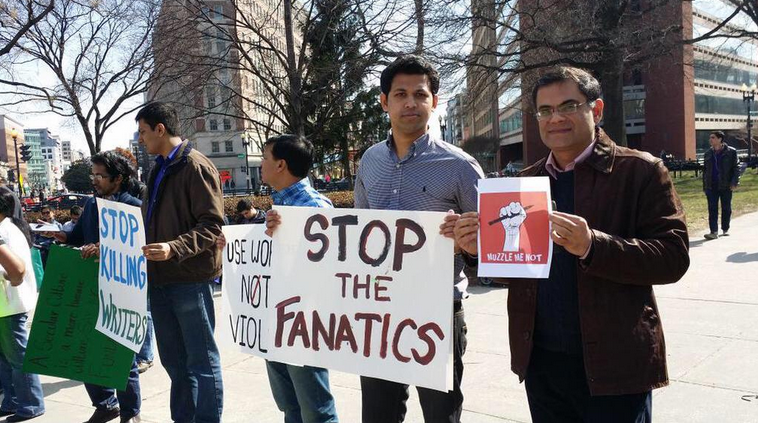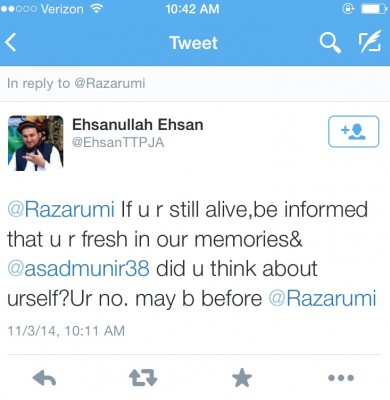
Raza Rumi (far right) at a demonstration in Washington DC, following the slaying of Bangladeshi blogger Avijit Roy. Photo posted on Twitter by Raza Rumi.
March 28 marks the first anniversary of the attack on Pakistani blogger and prominent political commentator Raza Rumi. Once a contributor to Global Voices, Rumi was added to the Taliban's hit list after he opposed government peace talks with the militant group in 2014. His moderate views also have been misinterpreted by some as anti-Islamic. When two gunmen opened fire on Rumi's car at a market in Lahore, his 25-year-old driver and confidant was killed. Rumi departed for the US shortly thereafter, at the urgings of family and friends.
Police in Lahore have since arrested six individuals in connection with the attack. Authorities reported that the six suspects confessed and provided a statement confirming that they are members of the banned sectarian outfit Lashkar e Jhangavi or LeJ, one of the most violent Sunni militant organisations in Pakistan that has been involved in various sectarian killings. Now living in exile in the US, Rumi told Global Voices:
I believe that these men are unlikely to be convicted or to serve significant jail time. But no matter the outcome of the case, I believe that I am likely to be attacked by these terrorist organizations as they are operating with impunity and have thousands of members across the country.
He believes that he is still vulnerable. “Until the government of Pakistan begins to eliminate the terrorist infrastructure, I believe that my vulnerability level will remain dangerously high.”
According to the media reports, LeJ leader Malik Ishaq has not been charged with the case and has been released from police custody. Rumi told Global Voices:
Given Malik Ishaq’s connection to my case, knowing that Ishaq has been able to orchestrate assassinations and terrorist attacks—even from behind bars, and hearing that Ishaq has recently been bailed out/released, I am extremely fearful for my safety in the event I were to return to Pakistan.
Threats from the Taliban Social Media Wing
Although he remains in the US, Rumi has continued to face threats online. After the November 2014 attack on Pakistan's eastern Wagah border with India that took the lives of 50 people and injured over 100 others, Jamat ul Ahrar, a Taliban offshoot, claimed responsibility for the attack. When Rumi learned of this, he tweeted about it. Jamat ul Ahrar spokesman Ehsanullah Ehsan, a former Taliban spokesman known for his social media savvy, saw Rumi's tweet and responded, saying:
“@Razarumi If u r still alive, be informed that u r fresh in our memories.” Rumi told Global Voices, “this confirmed my fears that the militant groups would try to kill me if I ever return to Pakistan.”
Rumi has also received other messages echoing Ehsan’s sentiment. Last September, a Twitter user* warned Rumi: “not to forget why [he] was attacked and that next time they would have no mercy.”
Accused of Being a RAW Agent
Rumi is also frequently accused on social media of being a spy for the Indian government intelligence agency known as the Research and Analysis Wing (typically abbreviated as “RAW”). In Pakistan, calling a person a “RAW” agent amounts to an accusation of treason that can warrant murder.
On August 29, 2014, Rumi received a Twitter message* stating that he should be hanged. The tweet read:
U SON OF A WHORE, I KNOW UR SON OF WHORE STOP SERVING UR $$ MASTERS, BASTARD U SHOULD B HANGED TRAITORS LIKE U WILL B SOON.
Rumi reported that yet another Twitter user* stated that he “hoped that I would be killed in a suicide attack by Al Qaeda” after he suggested that it was not India, but rather three groups associated with the Taliban, that were responsible for an attack.
Rumi longs every day to go back and walk freely on the streets of Lahore, but at the same time he is terrified of what might happen if he returns. And he is regularly reminded of the threats in Pakistan. “Other journalists, my friends, and my family have all warned me that they believe I will be tortured or killed if I return.” Albeit from afar, Rumi continues his fight against extremism and to promote an open, tolerant society.
* Editor's note: Raza Rumi shared with Global Voices screen captures of all of the tweets cited here. In the interest of protecting his safety, we will not republish these images or the names of their senders.




